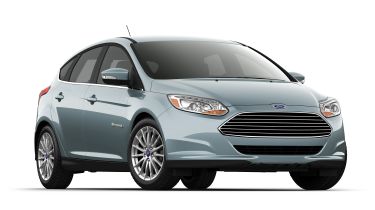Ford Focus Electric review
Ford Focus Electric car is late to the game. Can it keep pace with hi-tech rivals?

Although the electric Focus is an important step for Ford, it won’t find many buyers in its current form. It doesn’t have its rivals’ range and practicality, yet costs more to buy. Plus, the handling has been compromised by the electric conversion. The Hybrid Mondeo is likely to be much more popular.
The Ford Focus Electric is the manufacturer's first pure electric production car. The Focus Electric has already been on sale in US showrooms for two years, but this is the first chance European buyers will get to try emissions-free driving in such a familiar five-door package.
Power comes from two packs of lithium-ion batteries: one stored under the rear seats and one in the boot. Together they weigh 300kg, and give the Focus a range of around 100 miles for every full charge. Despite the extra bulk, straight-line performance is reasonably brisk, with the electric Focus recording a 0-62mph time of just 11 seconds and delivering its 250Nm of torque instantly.
In fact, there is so much pace, the steering wheel can squirm in your hands during acceleration. Top speed is limited to 85mph to preserve the battery, but you can reach and maintain motorway speeds without fuss and in near-silence.
Used - available now

2020 Ford
Focus
19,280 milesManualDiesel1.5L
Cash £11,900
2022 Ford
Focus
15,007 milesManualPetrol1.0L
Cash £16,800
2022 Ford
Focus
25,596 milesManualPetrol1.0L
Cash £15,900
2020 Ford
Focus
21,749 milesManualPetrol1.0L
Cash £13,740However, unlike the standard model, the brakes feel grabby, and selecting the ‘L’ on the gearbox to maximise energy harvested by the brakes can make this Ford hard to drive smoothly around town. A key difference between the Focus EV and purpose-built electric models like the Renault ZOE and BMW i3 is obviously that the Ford wasn’t designed to carry large battery packs.
As a result, the suspension feels a lot firmer over bumps. The chassis does a reasonable job of coping, but you’re always aware of the added ballast over the rear axle. Recharging from a standard three-pin household plug takes around 10 hours, and the battery pack means that the boot shrinks from the standard 316 litres to a rather less practical 190 litres.
The interior is virtually identical to any other Focus’, apart from a set of unique dials. A single speedo is flanked by two smart digital screens that record your driving data and energy consumption. Standard kit is equivalent to a Titanium-spec Focus, so the high-performance Sony DAB stereo, and part-leather seats are included, but none of that is really enough to merit the £33,500 asking price. Even after the £5,000 Government electric car grant, that still makes the Focus roughly the same price as an i3 Range Extender – a model that’s lighter, better to drive and has a 200-mile range.







